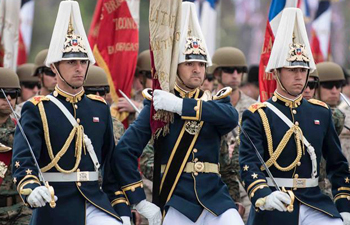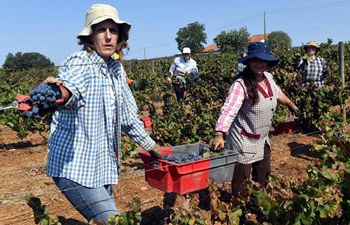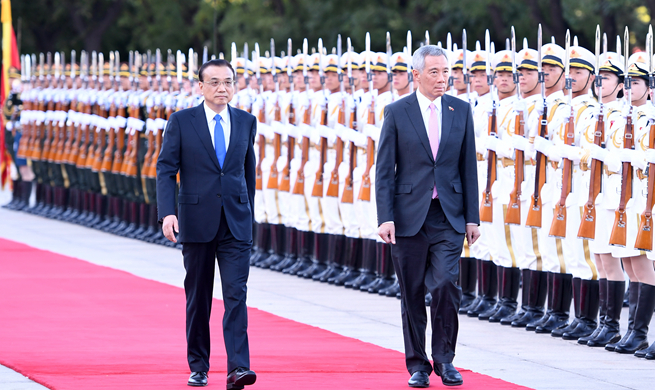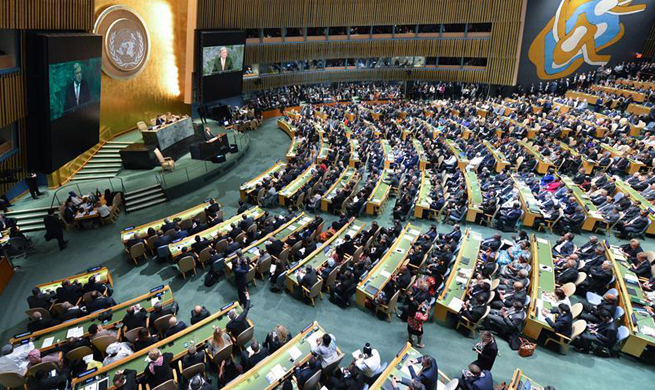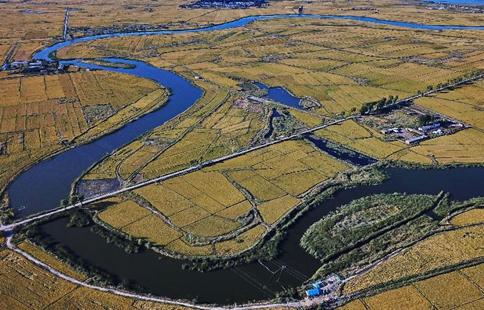BEIJING, Aug. 21 (Xinhua) -- A political documentary has inspired with details of the advance in the rule of law, while positive energy is gathering among Chinese ahead of the 19th National Congress of the Communist Party of China (CPC) scheduled for later this year.
The six-episode documentary, "Rule of Law in China," which is being aired by state broadcaster China Central Television (CCTV), summarizes the progress and achievements in legal reform since the 18th CPC National Congress in 2012.
Interspersed with authoritative theories and concrete legal cases, the documentary elaborates on the benefits and justice China's legal reform has brought to the people.
The documentary comes at a time when the country is comprehensively pushing forward the rule of law, said Zeng Dexiang, a teacher at a Party school in Jiayu County in central China's Hubei Province.
Zeng said the airing of the documentary will help officials better fulfill their duties in deepening reform, boosting development and maintaining stability with the rule of law.
Five years ago, China's new leadership pledged to build a modern socialist country and achieve the renewal of the Chinese nation.
Over the ensuing years, the rule of law has been high on the agenda of the leadership. In October 2014, the CPC vowed to accelerate the building of a socialist country based on the rule of law at the Fourth Plenary Session of the 18th CPC Central Committee.
"To comprehensively advance the rule of law will lay a solid foundation for the country's lasting stability and peace, and help achieve the great rejuvenation of the Chinese nation," said President Xi Jinping at the session.
The plenary was the first of its kind to feature the rule of law as a major topic, after which improvements to the legal system went into full swing.
In addition, "to comprehensively advance the rule of law" was included as one of the "Four Comprehensives," a strategic blueprint put forward by Xi for national development, which also contains creating a moderately prosperous society in all respects, deepening reform and strengthening Party governance.
"The CPC Central Committee has formulated or revised a series of intra-Party regulations and taken Party rules and discipline seriously over the past years, which is a guarantee for building a socialist country based on the rule of law," said Huang Libin, a local official in Quanzhou in southeast China's Fujian Province.
A high-profile anti-corruption campaign has led to the downfall of a number of high-level officials, known as "tigers" and lower-level "flies" who serve at the grassroots level.
Among the tigers felled in the campaign were Zhou Yongkang, a former member of the Standing Committee of the Political Bureau of the CPC Central Committee; Bo Xilai, former Party chief of Chongqing Municipality; Xu Caihou and Guo Boxiong, both former generals and vice chairmen of the Central Military Commission; as well as Ling Jihua and Su Rong, former vice chairmen of China's top political advisory body.
The handling of these cases has demonstrated that all people are equal before Party regulations, and the enforcement of such rules allows no privilege or exception.
China's judicial authorities have pledged to learn from past lessons and prevent cases of wrongful conviction.
During the term of the 18th CPC Central Committee, judicial organs have redressed 34 major cases which were mishandled, highlighting the case of Nie Shubin.
Nie was executed in 1995 for raping and murdering a woman on the outskirts of Shijiazhuang in north China. The Supreme People's Court revoked his previous verdict last year, ruling that the conviction had been based on insufficient evidence and unclear facts.
"We will continue to be bold in innovation, improve judicial justice and meet the people's expectation with better legislation," said Ding Yanghao, head of the people's court of the Pingtan Comprehensive Experimental Area in Fujian.
As stated in the documentary, advancing the rule of law in a comprehensive manner is an extensive and profound revolution which needs long-term and painstaking efforts.




